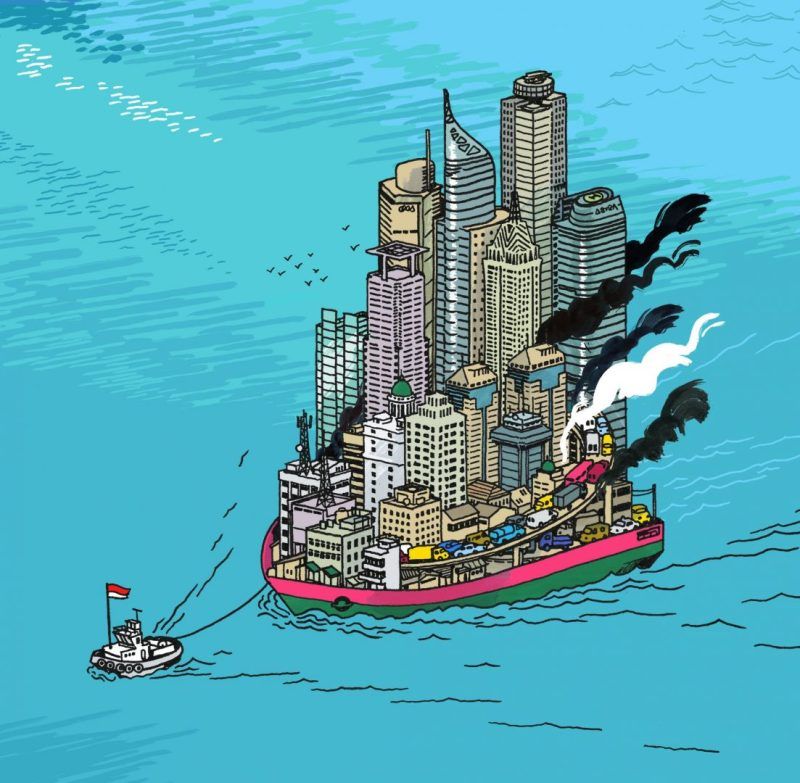
When I last visited North Penajam Paser, or P.P.U. as it is known to those limited few who have heard of it, in 2016, the easiest way to get there was by longboat. The harbor had all the attributes of harbors the length and breadth of “outer island” Indonesia — three or four food stalls shaded by recycled election banners; 10 or 12 friendly louts wearing soccer T-shirts and Monster Mash shorts, sitting astride their motorbikes and smoking without conviction; one or two S.U.V.s with the red license plates of officialdom, in which drivers waited for V.I.P.s returning from somewhere more happening.
“Capital in waiting” it certainly was not. Even most Indonesians would have had trouble locating it on a map — that is, until this week, when their president, Joko Widodo, announced that this dusty coastal district on the island of Borneo is to be the nation’s new capital, along with its neighbor Kutai Kartanegara. The plan, as it now stands, is to abandon the much-disparaged Jakarta (population approximately 40,000 per square mile) for the truly desolate province of East Kalimantan (population approximately 70 per square mile), starting in 2023.
Many are reasonably wondering how seriously to take the declaration; Indonesia is no stranger to improbable declarations, haphazardly carried out.
One could even argue that the nation itself is the result of one, when the man who became the country’s first president, Sukarno, was forced by zealous student revolutionaries to declare independence from Dutch colonizers, just two days after the Japanese defeat in World War II. (The second and final sentence of that declaration sums up the fly-by-the-seat-of-your-pants culture that has become something of a norm in Indonesian politics: “The details of the transfer of power, etc., will be worked out carefully and as soon as possible.”)
Yet even Mr. Sukarno was unable to move the new nation’s capital to Kalimantan, though he initiated the construction of the city of Palangkaraya for that very purpose. He, too, dreamed of a shiny, purpose-built capital near the country’s geographical center and far from the ghosts of the colonial past, but he was defeated by the magnetic force field of Jakarta and its host island, Java.
Though Java makes up just 7 percent of Indonesia’s landmass, it is home to 56 percent of its people, and 60 percent of its economy. Will Mr. Joko be more successful in escaping Java’s gravitational pull? It’s hard to say.
Jakarta certainly has plenty of detractors, and with good reason. It has crowded itself to a standstill. Around 40 percent of Jakarta’s 255 square miles is below sea level, and as the few remaining patches of open land get concreted over and weighed down with yet more glass malls, the city sinks further, and that proportion grows.
As Mr. Joko acknowledged when announcing the move on Monday, flooding is frequent and catastrophic; traffic jams are legendary; the air is foul. To this list he could have added: rising rents, lengthening commutes, fraying tempers. And no one (including the president, who is a former governor of the city) knows what to do about it. Easier, then, to skip town.
But moving the capital because no one can face tackling the problems that have been allowed to accumulate in Jakarta doesn’t make for good legacy headlines. And so the rhetoric around the move focuses instead on promoting national unity — by shifting the center of political gravity away from Java, where the capital has been situated since colonial times, and where most power in Indonesia resides. All but one of Indonesia’s presidents have been Javanese, and the island’s culture, with its extreme respect for hierarchy, has marked institutions throughout the ethnically diverse nation.
But will moving political institutions to Kalimantan really do much to promote national unity? It’s hard to see how shifting ministries will erode the increasingly visible gap between the haves and the have-nots. That’s shaped by companies, banks and factories that will remain firmly wedded to the Javanese lodestone. And without an increased sense of equity, outer-island Indonesians are unlikely to acquire a deepened sense of national belonging. The fact that politicians huddle in Washington has not, after all, made people in Midwestern states feel any less disaffected by norms that continue to be shaped by centers of power on Wall Street and in Silicon Valley.
And if it does move, whither Jakarta? It is as though a city of more than 10 million people has been thrown in the “too hard for now” basket by its former boss. If Mr. Joko’s improbable plan succeeds where its predecessors have failed, then business people will be left to get on with life in crazy, unlovable but ever-vibrant Jakarta as best they can.
Instead of investing in fixing the city’s problems, the government will spend an estimated $32.7 billion moving. Like rats leaving a sinking city, the politicians and civil servants will swarm toward the dream of a new, problem-free capital, while shuttling back to Jakarta for their business dealings. Assuming that an airport replaces the longboat harbor, it may be time to buy shares in Indonesian airlines.
Elizabeth Pisani is a visiting senior research fellow at the Policy Institute, King’s College London, and the author of Indonesia, Etc.: Exploring the Improbable Nation.
